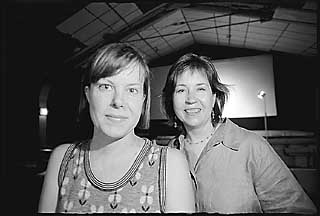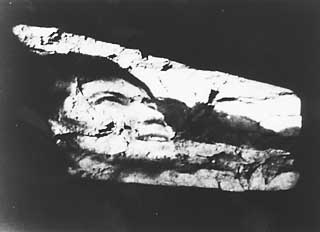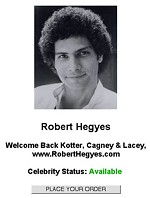Coming of Age
By Sarah Hepola, Fri., Aug. 20, 1999
|
photograph by Jana Birchum |
There are more, no doubt, and those of you who rattled off a slew of them are chafing at everyone else's ignorance. But consider this. Of the 46 films playing in Austin last week, only one was directed by a woman. Regardless of your film savvy, that's gotta smart. Although no one can deny the vast advancements women have made in every tier of the entertainment industry in this century's final reel, it is perhaps -- no, it is definitely -- too early to call it any kind of a victory. As long as familiar female directors can be counted on two hands, there is a problem.
That's only one of the reasons to take note of Reel Women's film festival, a provocative smattering of short films by women over the past decade. The selections are culled from a six-week retrospective at the Museum of Modern Art in New York entitled "Women Make Movies: Celebrating Twenty-five Years of Women's Media." Programmed with films acquired by the national nonprofit organization, Women Make Movies, the retrospective illuminated for many what -- if not Hollywood blockbusters -- women have been contributing to film for the past quarter of a century. Although Reel Women lacks the luxury to provide such a robust retrospective, their event is, rather, a celebration of women in film. It's also a watershed event for the organization, which consisted of only a few members and a pocketful of rainbows a few years ago. These days, the organization is a healthy nonprofit, sponsored by the Austin Writers' League. For them, this festival is a coming-of-age, and like all rites of passage, it is a grand celebration not only of where they've been, but of the remarkable places women in film are headed.
The story of Reel Women begins, like many, with another ending. It was April of 1996, and Kirkland had just lost her job. Disillusioned and frustrated, it was a time of reflection. She was "looking for a new direction," and it was about this time that she wound up at a Houston "Women in Film" meeting. The national organization, of which this was a local chapter, was jumpstarted in 1973 by some L.A. women after its founders grew sick of the frustrating reality for women in the industry. As Kirkland watched these women sharing war stories, offering support, chatting about common goals -- something clicked. With her dusty résumé sporting an RTF degree from UT, Kirkland returned to what had beckoned to her years ago in those collegiate salad days: making films. Kirkland and a friend, Anna Julia, co-founded Reel Women in Austin, envisioned as a grassroots networking group. It started small. Just a handful of women, sometimes as few as three, sitting around and talking about what was interesting to them. Eventually, Julia drifted away to do other things, but Kirkland stayed on. With a comforting maternal presence and a disarmingly wild, trickling laugh, she also seems well-suited to pull others into her circle. Her approach to the group, as it is today, was hands-on and utilitarian. What else can I learn? What do I want to know? What can we teach each other? This wasn't about Tupperware and tea parties, this was about learning a craft. They began looking for local women filmmakers to come talk to them, to pick their brains, and eventually hosted such local luminaries as Judith Sims of the Austin Museum of Art and curator of The Territory, Rick Linklater's frequent film editor Sandra Adair, the Austin Film Society's former managing director Elizabeth Peters, and an independent documentary filmmaker named Dawn Cooper.
Working on a documentary together, Cyndy and Dawn bonded, and soon Cooper -- a fresh-faced young woman with straight, unfussed hair and a tan, healthy frame -- were ready to take the group to the next level. Into their mix came Ruhi Zandra (busy working on the locally filmed Natalie Portman movie, Where the Heart Is, Zandra was unavailable for an interview). Finally, the stool had three legs. And then, it grew wings.
|
|
So why is it that no men can join? "Sometimes women tend to be technophobes," Kirkland explains, "and this kind of hands-on training is what is needed to take the fear out of technology." She's noticed, sometimes, that when men enter the mix, it throws off the equilibrium. It's not a nice thing to talk about, really, but sometimes women want to leave the "technical" stuff to the guys. Although we could all go in circles about the arguments for keeping this process single-sex, something like debating about whether a co-ed education is better than an all-girls school, in the end, it's all rather beside the point. Reel Women is simply about offering the opportunity to form a well-rounded base of knowledge in film and how important it is to be self-sufficient. "We really wanted to emphasize the fact that no one else is going to do this for you," Kirkland states emphatically. "You have to know how to do it yourself."
In April of 1997, New York's Museum of Modern Art turned the spotlight on just those kind of women -- women who have done it themselves. Their "Women Make Movies" retrospective snagged the attention of Reel Women, who were looking for a festival to mount, something "to promote women," but with enough steam and intrigue to attract a broader audience. After flipping through extensive catalogs, watching miles of films, the Reel Women selection committee settled on nine films for their festival. What they've selected doesn't even purport to be any kind of comprehensive retrospective, of course, but is a diverse and intriguing sampling. Although both Cooper and Kirkland deny the festival program holds any common theme other than a "woman's perspective," the films do harbor similarities, more in tone than in theme. With the exception of Noonan's hilarious "Your Name in Cellulite" and some of Campion's quirkier work, the films are largely introspective, often deeply personal, approaching such emotional topics as incest, virginity, political siege, body image, mother-daughter relationships, and teenage pregnancy with a delicacy, thoughtfulness, and an artful expressiveness. The films give the impressions of striving valiantly to understand difficult and sometimes humiliating individual experience, to dissect the big machine and discover how it all works. The selections are also short films, ranging in length from six to 67 minutes, a choice which serves the dual purpose of allowing a larger number of films to be screened as well as demonstrating that, as Kirkland explains, "short films aren't just a stepping stone to narrative, they're a wonderful, viable medium."
Intricate, evocative, and sometimes deeply haunting, the series offers a markedly alternative experience to the summer's testosterone-heavy bang-'em-ups. Although its organizers insist the festival is not necessarily "better than" as much as it is "different from," they are also quick to decry the way women are portrayed onscreen. "It's just frustrating as a moviegoer constantly seeing everything from a male's point of view," gripes Cooper, and really, it's tough to disagree. What these films open up, at least for discussion, is how acclimated we are as audiences to the male point of view. It's a discussion Kirkland and Cooper are hoping people have, not only at their parties, where filmmakers Jo Andres and Gail Noonan will be on hand, but at their Saturday panel, which features documentary filmmaker Anne Lewis and UT assistant professor in RTF, Nancy Schiesari, sharing their thoughts on the state of women's film. But really, it's not just political. "We hope to inspire people," Cooper says. "I think one of the best ways you can communicate your point to someone is to have them sitting in the dark in the theatre and to be completely impressed." More simply than that, though, the Reel Women just hope their festival reminds everyone that women do, in fact, make movies.
Unfortunately, it's too easy to forget. But there are so many reasons to believe that it's getting better. Here's a few: Lisa Cholodenko, Nancy Savoca, Gillian Armstrong, Penelope Spheeris. And the company they keep under that all-too-rare nomenclature "female filmmaker," is growing larger, stronger. By the way, in case you were wondering, the only film directed by a woman playing in Austin last week was Joan Chen's Xiu Xiu: The Sent Down Girl. It's a tough number to wrap your head around: only one in 46.
This week, there are 15.
Tickets to each screening are $5; $20 for a festival pass (cash only), available at the kickoff party at GSD&M or at individual screenings. "Reel Women Presents: Women Make Movies" is sponsored by 101X, GSD&M, Liberty Catering, the Austin Film Society, the Four Seasons Hotel, Celis Brewery, Liberty Bank, Team Tech International, CinemaTexas Enrichment Fund, and The Austin Chronicle.










